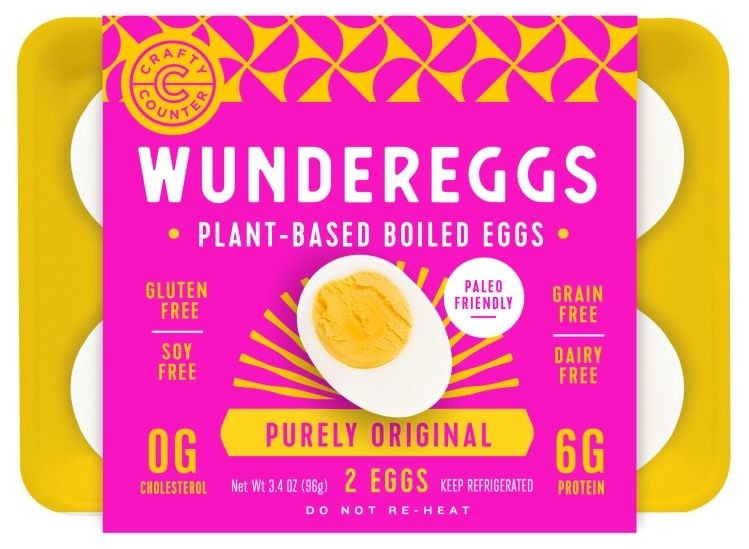Austin, Texas-based startup Crafty Counter unveiled what it claims to be the world’s first plant-based hard-boiled eggs, WunderEggs. The hard-boiled egg dupe looks, cooks and tastes like a chicken egg, but without the chicken, and is set to debut in the market before the end of the year. So, how did Crafty Counter hatch a plant-based egg indistinguishable from the real thing?
Whether it meant to or not, Crafty Counter provided an answer to the ultimate question of which came first, the chicken or the egg? It’s answer: the egg, and the chicken didn’t exist at all. The “egg white” consists of nuts and agar, a plant-based gelatin derived from seaweed, and the yolk is made from nuts, turmeric and black salt. The analogue is also soy-, gluten- and grain-free, much like real eggs. Once cooked and packaged, WunderEggs are treated with high pressure processing, allowing them to stay fresh in the refrigerator for up to 120 days.
Hema Reddy, the founder of Crafty Counter, wanted to ensure the ingredient list was as short as possible and featured ingredients consumers could recognize and pronounce. Though the price is not finalized, WunderEggs are set to launch with a suggested retail price (SRP) of $5 for two eggs, significantly higher than the cost of a dozen eggs in the US.
How else do WunderEggs compare to chicken eggs? Nutritionally, they contain around the same amount of saturated fat as real eggs, minus the cholesterol. However, WunderEggs contain slightly more calories and less protein than real eggs, which Crafty Counter is hoping to improve upon for the second version of the product. They also lack many of the nutrients found in traditional eggs, such as choline and vitamin B12, but later versions may include additional nutrients.
While WunderEggs may not be as nutrient-rich as chicken eggs, they were created with the purpose of cutting down on the environmental damage caused by factory farming. Internationally, the vast majority of eggs come from factory farms, in which hens are confined to small cages for days at a time to produce one egg. When the US food system began to break down at the beginning of the pandemic, Crafty Counter saw the opportunity to create a product that didn’t rely on complex supply chains or live hens.
The product not only caters to environmentally conscious consumers, but also to health-conscious ones, as it contains plant-based whole foods and steers clear of highly-processed ingredients. The company’s ethical and climate-friendly philosophy is apparent in its existing range of plant-based products, including three flavors of Wunder Nuggets, plant-based nuggets made from legumes, seeds and vegetables.
WunderEggs are not the only plant-based on the market. Aside from pioneer brand Eat Just, that launched its mung bean-based JUST Egg back in 2013, more startups are now entering the space. California-based startup Clara Foods is working on manufacturing animal-free eggs on an industrial scale, with other players including UK-based CRACKD, Israel-based Zero Egg and Mumbai-based EVO Foods.
While plant-based meat and dairy markets are over-saturated with options, until now, egg substitutes have been somewhat limited. But the market is poised for rapid growth as better technology and more products are emerging. In 2020, US plant-based egg consumption rose 168 percent and the market is projected to grow into a $1.15 billion industry by 2022.












Join or login to leave a comment
JOIN LOGIN